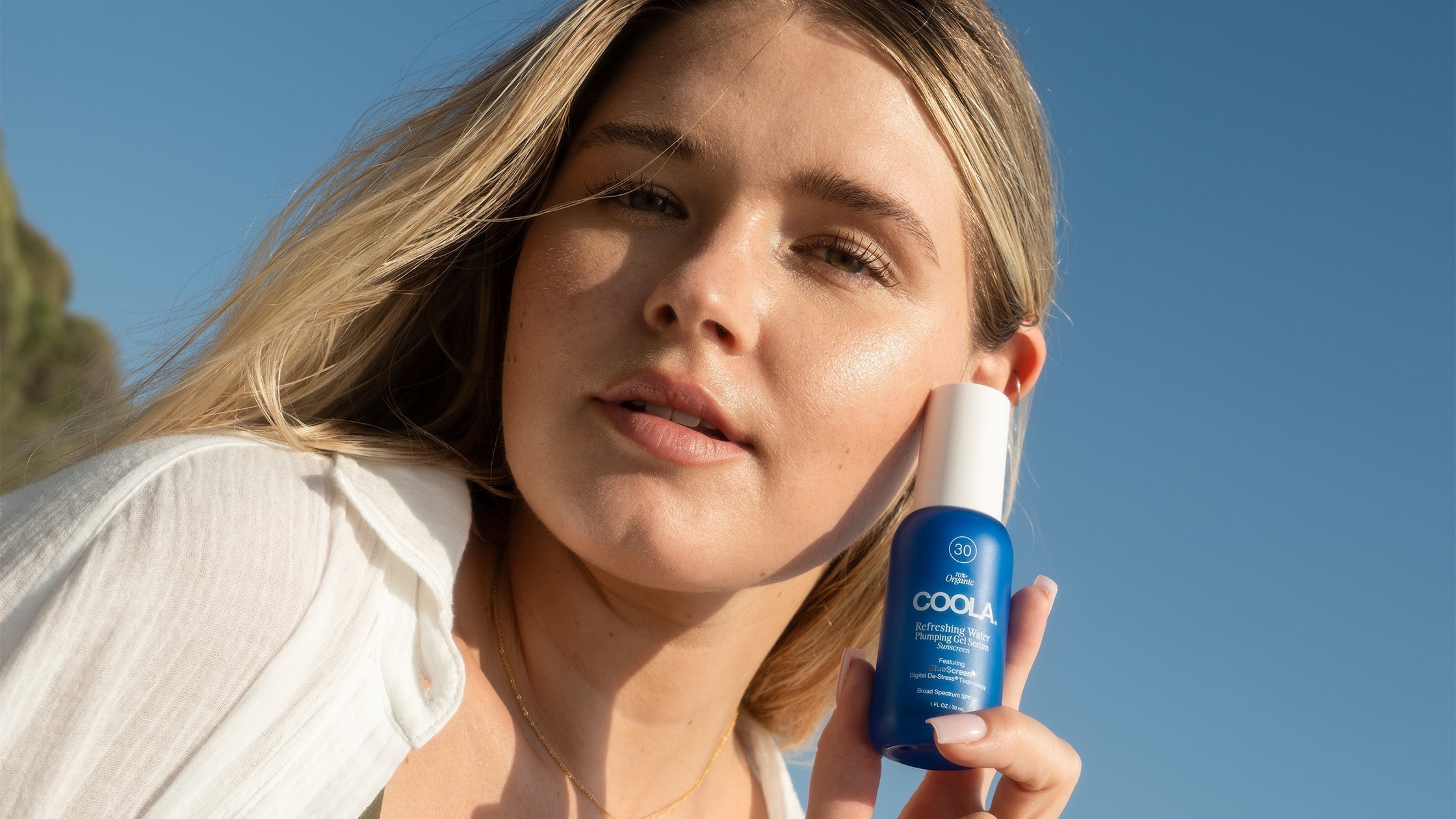
Should You Wear Sunscreen Inside?
If your day-to-day schedule keeps you mostly indoors, sunscreen might feel optional. But between sunlight streaming through windows and constant screen time, your skin is still exposed to environmental stressors. That’s why daily SPF is just as important inside as it is out.
When you’re indoors, UV and blue light are still concerns. How you approach them matters.
In this guide, we’ll break down when and why you still need SPF indoors.
Are You Supposed to Wear Sunscreen Inside?
The short answer? Yes!
Here’s why:
- UVA rays can penetrate windows
- HEV (blue light) from screens can stress skin
- If you sit near a window or in front of screens for hours, daily SPF matters
These points are elaborated on below, focusing on the benefits of wearing sunscreen daily, even when indoors.
When Should You Wear Sunscreen Indoors?
If you’re usually indoors, you may not think sunscreen is necessary. However, there are instances where protection is recommended—especially when the UV level is high or when you’re using screens for extended periods.
If you’ve been asking yourself, “Do I need sunscreen inside the house?” here are some examples of when sunscreen is recommended indoors.
You Sit Near Natural Light
For those of you who enjoy a window view throughout your day, know that while most windows block UVB rays, UVA rays penetrate windows. This exposure increases your risk for skin damage and the effects of aging.
In comparison to UVB rays, UVA rays have longer wavelengths that allow them to pass through window glass. These rays penetrate deeply into your skin, increasing your risk of damage and resulting in premature aging, wrinkles, and other long-term concerns, including a higher risk of skin cancer.
They are also present throughout the day and year, unaffected by weather or altitude. So, exposure to UVA rays while indoors, especially when near a window all day, is a concern.
You Use Screens for Hours
If you spend hours in front of screens, high-energy visible (HEV) light, often referred to as blue light, is another reason to invest in daily sun protection. While concerns surround vision and sleep in relation to HEV light, your skin health is also a significant consideration.1
The average American spends approximately seven hours and three minutes online daily, prompting researchers to delve deeper into the impact of environmental stress on skin health, particularly the effects of blue light.3 Numerous studies have shown a link between blue light and an accelerated aging process, which may also lead to hyperpigmentation.4
You Want Consistent Skin Protection
Consistency is key to achieving sustained results. An everyday SPF habit will help you ensure better results with damage from unexpected exposure, whether that’s sitting near a window for hours or popping outside to run an errand.
This routine becomes even more effective when incorporated with a face moisturizer with hyaluronic acid. You can start a morning routine, getting into the habit of reapplying when necessary.
What Kind of Sunscreen Should You Use Indoors?
Want to start enhancing your daily SPF routine? Here are some high-quality options.
Serums or Drops
SPF Serums and drops offer a lightweight, skincare-first approach to daily sun protection.
Check out:
- SPF drops with anti-aging benefits
- Water-light plumping gel serum
- Oil-free moisturizer with SPF 30
Face Oils with SPF
These sunscreen oils are both protective and nourishing. COOLA Face Oil SPF 30 is an organic ultra-lightweight oil that smooths, firms, and protects for youthful-looking skin.
Should You Reapply Sunscreen Indoors?
Ideally, yes, you should reapply throughout the day.
The FDA recommends reapplying sunscreen every 2 hours when you’re exposed to the sun.2 If you’re sitting near windows, spending time in direct sunlight, or frequently touching your face, it’s smart to follow this guideline even indoors.
If you’re away from windows or in a low-light setting, you may not need to be as strict. In those cases, a midday reapplication with an SPF mist or drops can help maintain coverage without overdoing it.
FAQs About Wearing Sunscreen Indoors
Do you have to wear sunscreen inside if working from home?
Yes. Even indoors, your skin is exposed to UVA rays through windows and blue light from devices. Wearing SPF every day helps keep your skin protected, no matter where you work.
Does blue light from screens damage skin?
It may contribute to accelerated aging and dark spots. SPF with blue light defense helps mitigate these effects, especially when incorporated into your daily skincare routine.
What sunscreen is best for indoor use?
A lightweight SPF is ideal indoors, giving you protection without the heavy “sunscreen” feel. Options like the COOLA oil-free SPF moisturizer or the tinted moisturizer with SPF provide daily defense while keeping skin comfortable and fresh.
Do windows block harmful UV rays?
Not fully. While glass blocks most UVB rays, UVA rays still come through and can cause long-term skin damage.
Is it okay to skip sunscreen indoors?
We know it’s easy to forget from time to time, but we recommend making SPF part of your daily routine. Consistency is what helps keep skin healthier and better protected in the long run.
Indoor SPF Is the New Non-Negotiable
Although you may think the risk and level of exposure are minimal, daily UVA and blue light exposure add up. That is why you want to choose SPF products that fit into your skincare routine.
Explore COOLA’s complete collection to find the best SPF products for your lifestyle and everyday use.
Sources:
- Digital Devices and Your Eyes. AAO.org. Published 2024. https://www.aao.org/eye-health/tips-prevention/digital-devices-your-eyes
- U.S. Food and Drug Administration. Sunscreen: How to Help Protect Your Skin from the Sun. FDA.gov. Published 2024. https://www.fda.gov/drugs/understanding-over-counter-medicines/sunscreen-how-help-protect-your-skin-sun
- 17 years of your adult life may be spent online. Fortune Well. Published 2024. https://fortune.com/well/article/screen-time-over-lifespan/
- Kumari, J, et al. The impact of blue light and digital screens on the skin. J Cosmet Dermatol. 2023. https://pubmed.ncbi.nlm.nih.gov/36594795/





